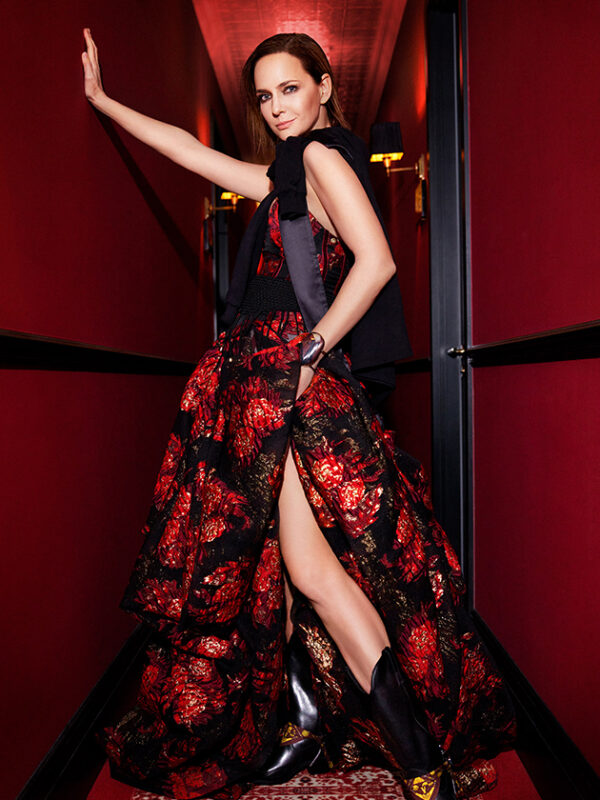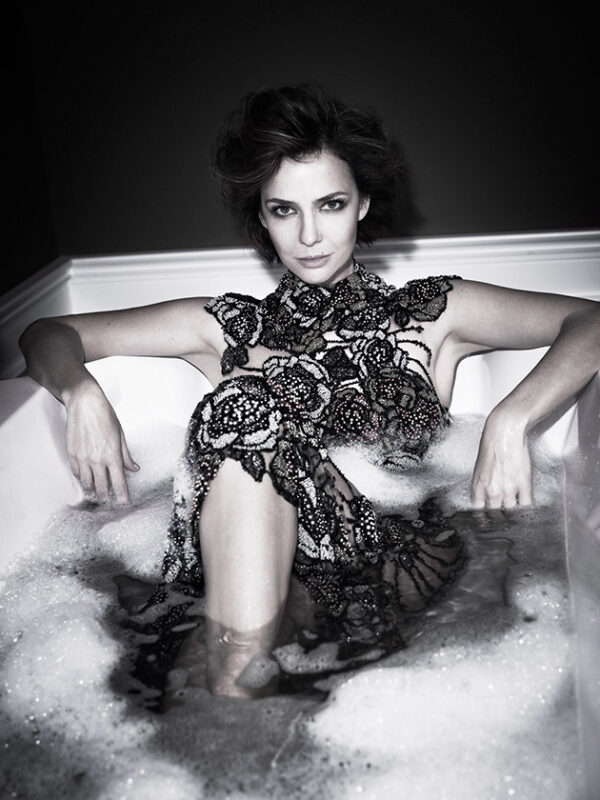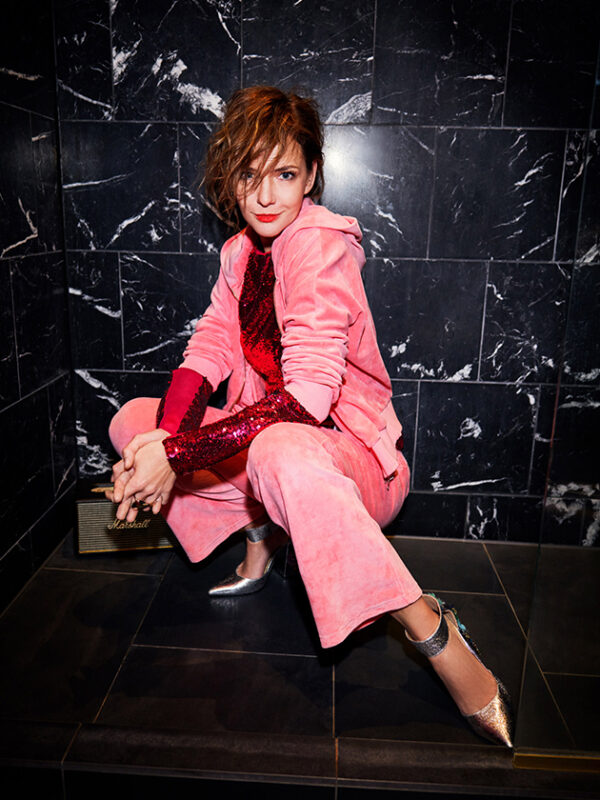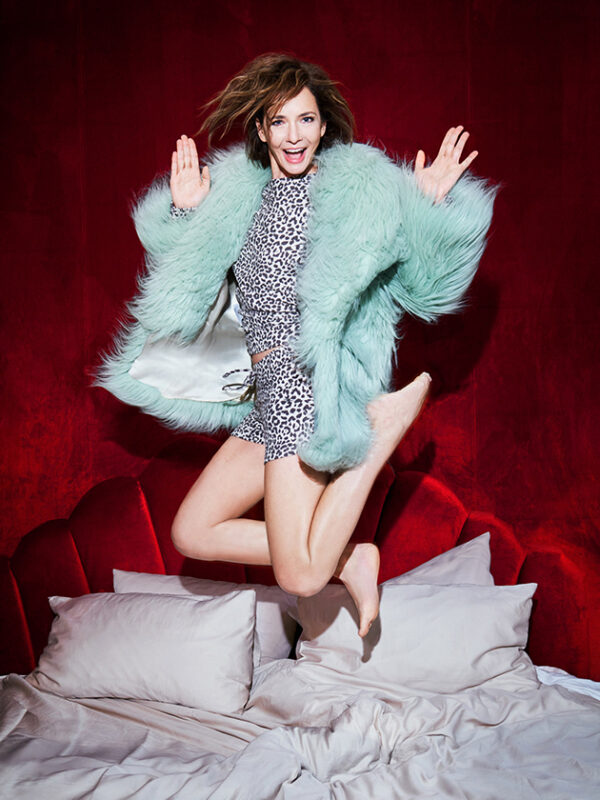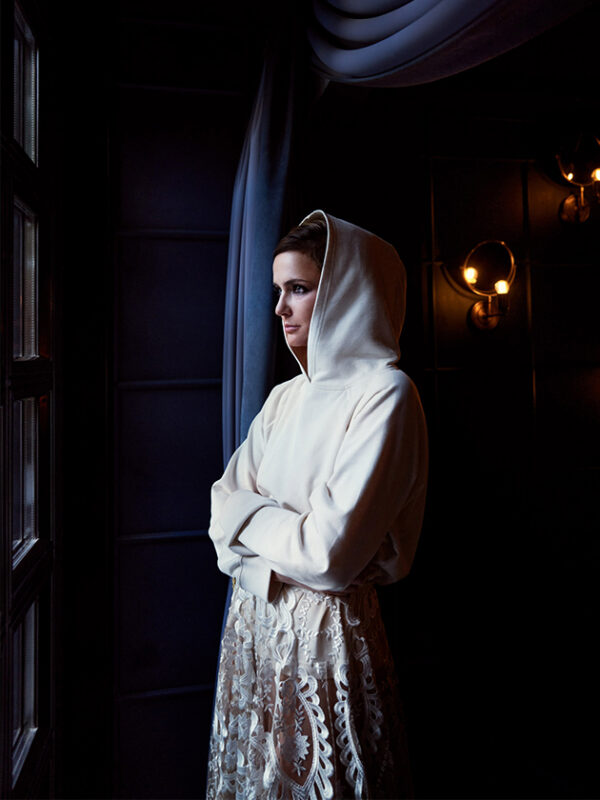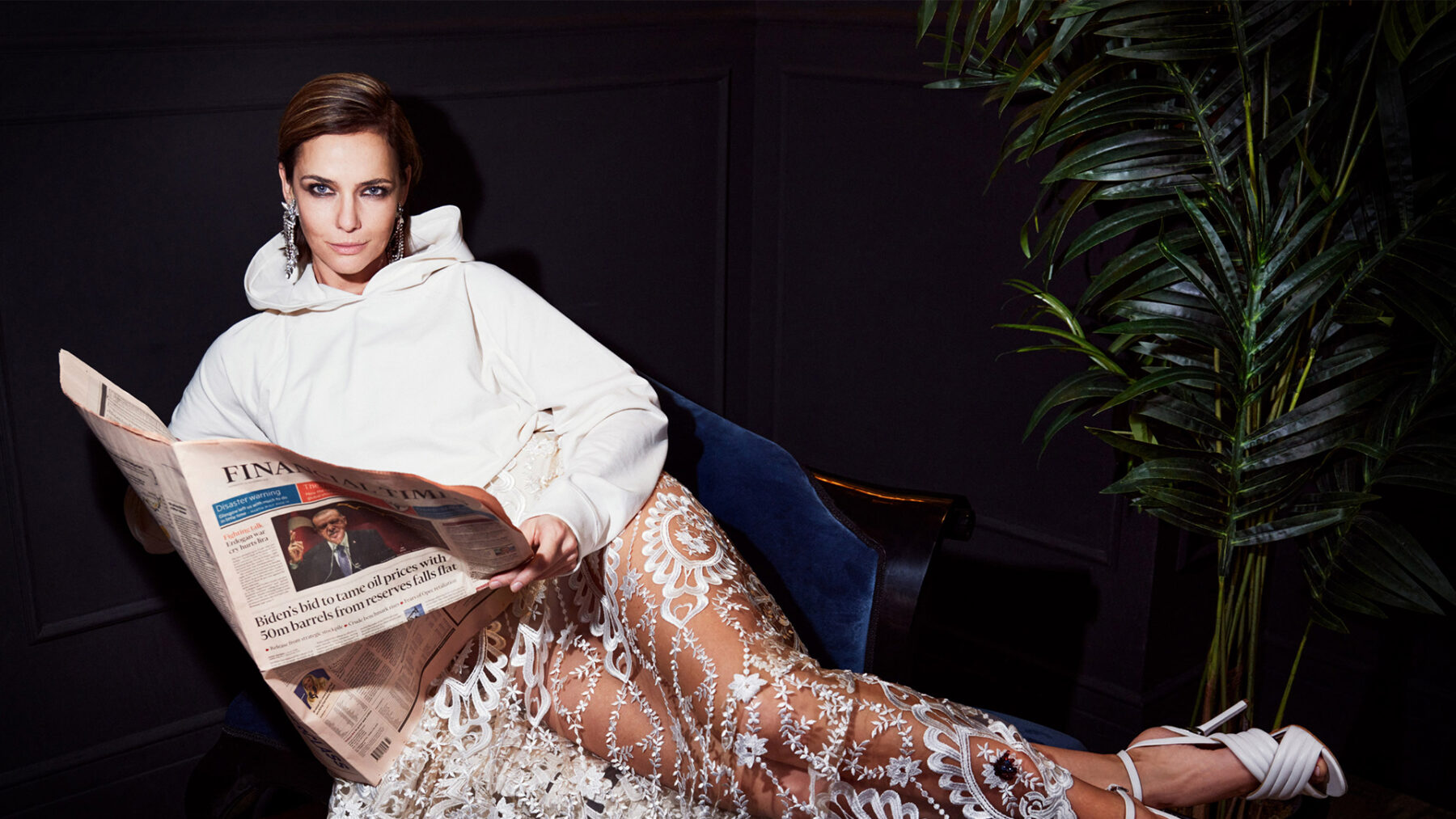Judith Dommermuth by Michaela Cordes | 4th March, 2022 | Personalities
With more people working from home, sweatpants have officially become part of the new office uniform. That loungewear can also be paired with elegance is the philosophy of Judith Dommermuth. The founder of leisurewear brand Juvia about new male customers, the right outfit for Angela Merkel and the importance of listening to your gut instinct.
She steps into her office in Montabaur, dressed in a striking low-key outfit consisting exclusively of pieces from her own collection: A sand-colored cashmere sweater, beige sweatpants – the only items not belonging to her Juvia brand are the pale brown suede boots. “What makes us totally unique is that we focus solely on loungewear and leisurewear,” explains the CEO with a smile as she sits down at her desk, taking a sip from her coffee mug. What used to be a revolutionary approach to fashion prior to the pandemic, has become the new way of dressing – an attitude the founder has lived by herself since over eight years.
Cashmere-lined, luxuriously soft sweatshirts, T-shirts made of the purest cotton and, of course, sweatpants, available in six different fits in both patterned and plain-colored designs. Juvia is Judith Dommermuth’s brainchild and at the same time her go-to label for her everyday life: “Open up my wardrobe and you’ll find a few evening gowns – but everything else is Juvia!” What started as an idea for more comfort for women who still want to dress elegantly has turned into a strong brand. Every season Juvia offers its customers 380 items, all made in Portugal and designed to be combined with other pieces from the new and past collections. The growing interest in wearable outfits that are stylish enough to wear when working from home and still feel comfortable is an international phenomenon which has been accelerated even more with the outbreak of COVID. In the U.S. alone, sales of sweatpants rocketed by 80 percent in the first three months of the pandemic. Industry experts predict that global sales of loungewear will continue to rise to a staggering ten billion by 2026. In this fast-paced market, the German label is also witnessing a steady increase in demand: “Yes, we experienced very satisfactory growth over the past two years,” says the fashion entrepreneur.
GG: Ms. Dommermuth, even before the pandemic started, you were already considered an authority on loungewear and educated your customers that comfort and elegance aren’t mutually exclusive. How has the new reality, with working from home and Zoom meetings, affected your business?
In addition to our core business with collections for women, we have seen an incredible growth in our men’s range. The turnover in this segment has doubled the past year! The reasons are quite simple. I believe that once the focus turned more towards life at home, men started asking themselves whether there wasn’t something more comfortable they could wear when working from home and still look stylish. Funnily enough, we realized that it was the women ordering those outfits for their partners. Designs like our loosely cut blazers made of sweatshirt jersey have been incredibly popular with men. The timing was just absolutely perfect for Juvia. Our online shop was coincidentally up and running shortly before the pandemic started, which was of course a crucial fact that enabled us to keep on performing well, despite the lockdowns.
In the face of these changes, sentiments like the iconic quote by Karl Lagerfeld, “Sweatpants are a sign of defeat. You lost control of your life so you bought some sweatpants,” suddenly seem completely outdated. How have high-end streetwear designers like Virgil Abloh, who worked for the luxury group LVMH and sadly died last year, increased this trend and also made your label more visible?
Casualwear today caters to a much broader audience. Happily, though, we started Juvia before the great buzz around leisurewear began. By the time the hype around high-fashion brands like Abloh’s Off-White really took off, we had already established a wide, appealing collection. When boutiques then were suddenly waking up to the trend, seeking affordable loungewear brands, we were the first elegant casualwear label in Germany that was able to deliver. Essentially, we were lucky to be ahead of the trend.
Today sweatpants have become an integral part of every designer collection and firmly established and accepted as an “it” fashion piece. How do you personally realize that society has accepted sweatpants in every day life?
Well, I can only say: people don’t stare at me in the supermarket anymore! (She laughs) Before the pandemic, I used to be the only person shopping in loungewear. Now it’s almost the opposite. I rarely see people standing in line at the checkout counter dressed in formal workwear.
What makes your collection different?
We focus exclusively and very consciously on loungewear and leisurewear. A casual but still elegant look which ensures that, depending on how you combine the individual items, you’re always well dressed. If I combine a plain-colored set with elegant shoes and striking jewelry, it instantly makes the look super-sophisticated. If I pick an eye-catching pattern and team it up with sneakers and, for instance, a cap, then I have a flattering streetstyle outfit. In other words, you can dress the looks up and down to suit your mood. What’s really important is that all the items are absolutely functional and practical, for instance in that they wash well without losing their shape. But what makes us truly unique is our choice of six different fits. Not every woman has the figure of an 18-year-old model, and we want everyone to feel great in our clothes. For example, if a customer likes our Slim Fit pants, then she knows that she will always be able find that style among our items, even months later and in a different collection. Or our Regular Fit, which has patch pockets on the back and hence looks more dressy than wearing the styles without pockets. The same applies to our tops. Alongside our Basics, we also have a range of Fashion Pieces, but ultimately the Basics account for roughly 75 percent of our sales.
Who is your typical customer?
We have a very broad target group. It starts with our Mini Me Kids Collection – my nine-year old niece will make a fuss if she’s not allowed to wear Juvia pants to school. But equally, our fan base also very much includes someone like my grandmother, who used to love Juvia so very much. Juvia is truly ageless. Of course, younger customers will buy different styles than our older ones. When I sit down to design a piece, I always aim for the middle. But there still isn’t a single item for adults that I haven’t personally tried on before we produce it.
You have always been and still are the fitting model for your own brand. The idea to launch your own loungewear range came twelve years ago, when you were working as a fashion model, f lying all over the world for work. How did you come up with the idea for Juvia?
I have an identical twin sister, and when we were five years old we were booked to model in a commercial for the first time. We continued modeling when we were teenagers, later using our income to pay for our university education. After our preliminary diploma – we both studied business management – we took a year off; afterwards, instead of continuing at university, we carried on modeling professionally. I learned so much about the fashion business in those years. During those times I wore sweatpants on a daily basis because they didn’t leave marks on your skin and also because I always craved the comfort factor and easily feel the cold. During those days I couldn’t find any brand I liked. The loungewear collections available in the U.S. at the time were either too brash and glittery or too sporty and stiff. I wanted something that was purist, elegant and low-key, really comfortable and soft on the skin. I soon realized that what I wanted didn’t exist!
In 2013, you took the plunge and started with your first sample collection. Two men helped you birth the business idea that led to your company Juvia: your husband, Ralph Dommermuth, and your ex-husband (and present co-CEO) Bernd Berger. Can you explain?.
By the end of my active modeling career, I had started organizing photo shoots for fashion companies as a sideline and briefly toyed with the idea of opening an advertising agency. But then my husband Ralph took me aside and said: “You’re always talking about this loungewear idea – what are you waiting for?” And then he said something that remains incredibly important for me: “There’s no shame in failing! But looking back and regretting not having tried would be a great pity.” That was the decisive nudge that gave me the courage to launch Juvia.
Your ex-husband Bernd Berger helped you with the production of the first collection pieces. What was your biggest challenge at the beginning?
Bernd comes from a family with a background in textiles and knows all about fabric qualities and technical processes. Since he was still involved in the family business when Juvia was launched, he recommended a freelance designer who helped me to bring my ideas alive, since I am not a designer by training. I managed to secure the very best showroom I knew from my modeling days for the next trade fair and thus immediately had contacts to the best buyers. But when the first 20 pieces were finished, I suddenly was convinced that the collection was not good enough to launch and so I decided to cancel the showroom and instead redesign the entire collection. Acting with such resolve was a decisive moment for me. I signed up a new designer, who is still with Juvia today, and I designed 40 new pieces that turned out perfect and could be mixed and matched beautifully. That collection was finally so well received that we immediately picked up orders from 42 boutiques.
Most people think digital marketing is the only way to generate success, but you used print ads in leading women’s magazines to draw attention to your new brand. What was the strategy behind this approach?
I am still a firm believer in print! The second important piece of business advice also came from my husband. After the first collection had been so well received, he told me: “You’ve obviously nailed a demand – there are so many fashion brands out there. Now you need to market your brand!” I had invested all my savings from my modeling jobs in the sample collection and hoped that the rest would cover the production costs. I simply didn’t have the money to spend on marketing. So he said: “I’ll give you a loan at the standard interest rate.” At first I was a bit taken aback that my husband didn’t just give me the money. But he had a good explanation: “Later you’ll be proud knowing you achieved the success all by yourself.” So I ran campaigns in fashion magazines to coincide with the trade fair where we presented our second season. And it worked! Many intrigued customers came to the showroom with the ad in their hand, and a few days later we had signed 120 boutiques! Today, roughly eight years later, Juvia is sold in 20 countries, with Germany, Austria, France and Switzerland as our main markets. We run two showrooms of our own in Munich and Düsseldorf and are currently looking for a third in Zurich. Three years ago I paid back the loan to my husband. And today I really am grateful for his advice. I could look like the typical cliché: model tries her hand at fashion with her successful husband’s money. But I can instead look at myself in the mirror knowing that I have paid back everything plus interest (along with a bank loan that I had taken out as well). The business now pays for itself. Without my husband’s good advice – to expand quickly – and without my great team, it would have taken so much longer for our brand to grow.
Is it true that Angela Merkel once asked you what loungewear is?
(She laughs) Yes! I was once invited to a panel discussion at the chancellor’s office. When I explained to Ms. Merkel what I was doing with Juvia, she said: “Ah, that’s something I never have time for.” Actually, now that she has retired, I should send her a parcel!
What pieces would you recommend for someone new to loungewear like Angela Merkel?
Well, she’d probably need to familiarize herself with the whole concept at first, I would recommend entry level pieces such as our Loose Fit Sweatpants, which look a little dressier and can be turned up around the ankles. Perhaps in navy blue or a sandy color. I’d match that with a high-quality Cashmix sweater, very simple and purist, but so soft that you’ll never want to take it off.
You started Juvia with four friends in your Cologne apartment. Today you employ 38 people and sell through 850 stores. Where do you see yourself going with Juvia in the next ten years?
I would never have dared to dream that we would be where we are now. To enable the company to keep pace with our dynamic growth we have just recruited some new members of staff who will be handling logistics, staff development and online activities. This is a culture change for us, but it is absolutely essential for our continued growth. As far as the future is concerned, I am torn between several options: We could expand into more countries, but on the other hand, I cherish more private time. For me, Juvia is still essentially a modern family business. And its primary purpose should be to bring joy – to our customers, to my employees and to myself.
